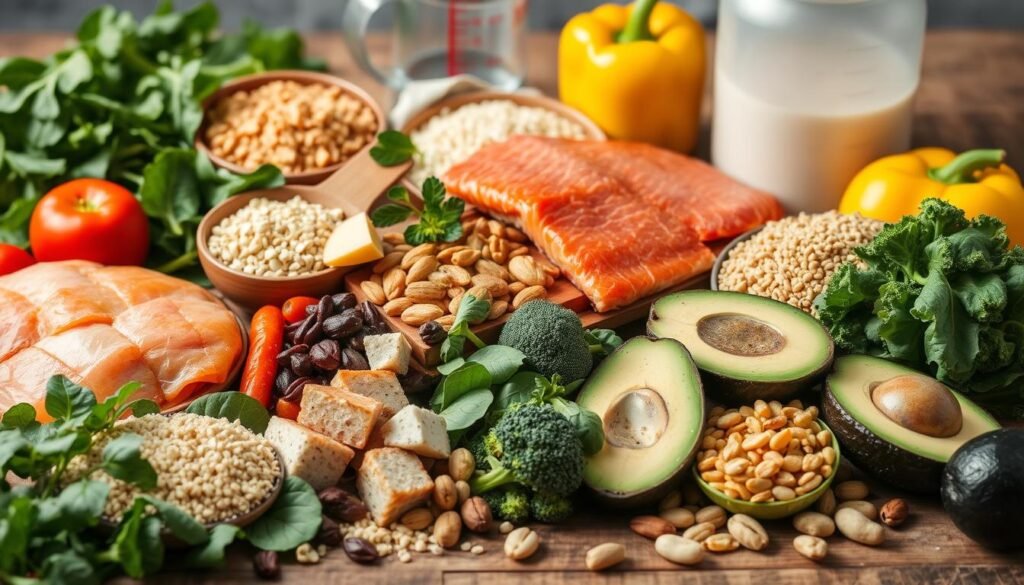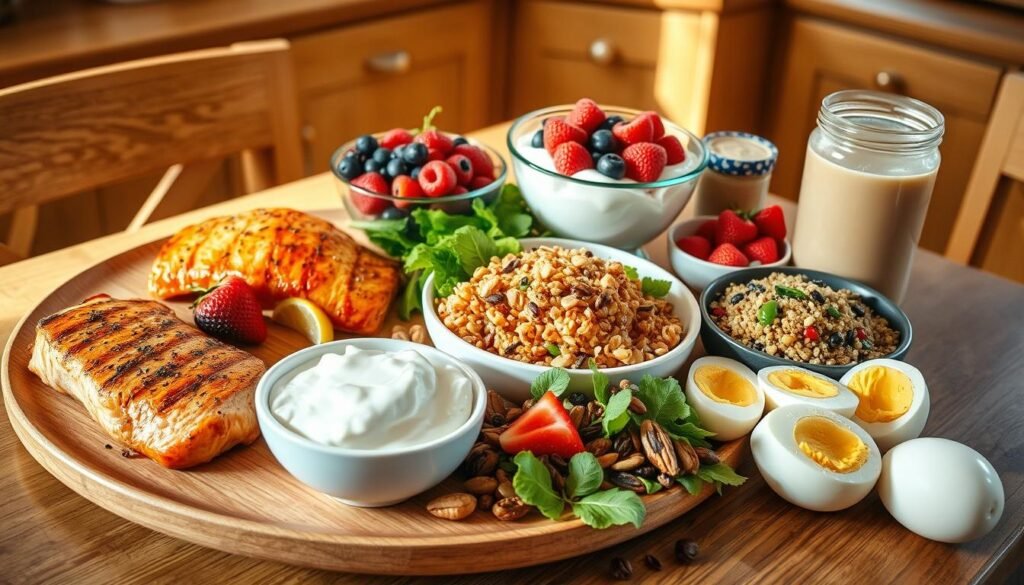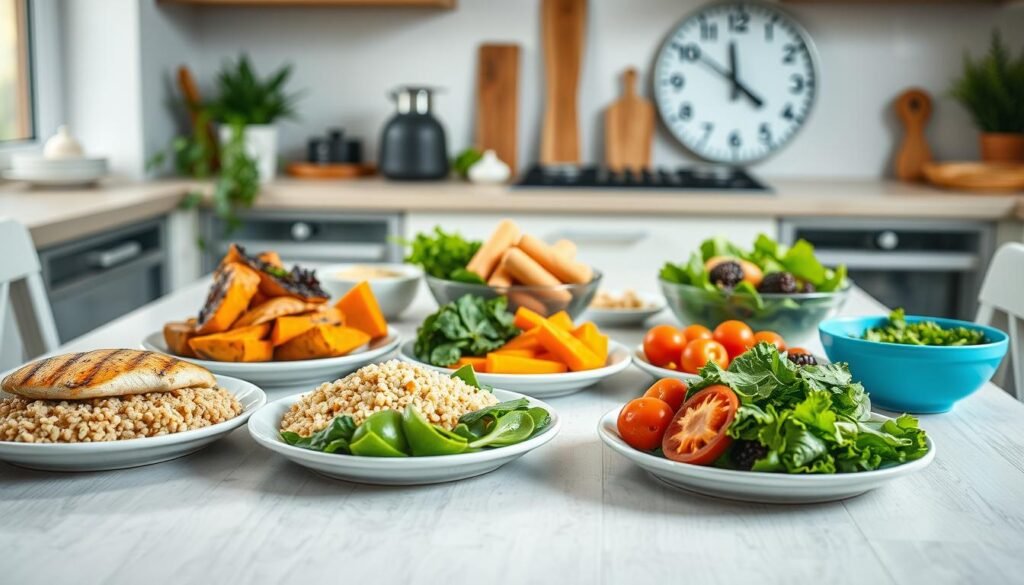About 80% of top bodybuilders say meal prep is key to gaining muscle. It’s not just about eating a lot. It’s about eating right. The best bulking meal has a mix of carbs, proteins, and fats. We aim for 35% carbs, 40% proteins, and 25% fats. This mix helps muscles grow and keeps your energy up.
This guide will show readers different meals for bulking. We’ll cover everything from clean to dirty bulking. You’ll also learn how to prep your meals well. Whether you’re starting out or have been building muscle for years, this article has something for you. Let’s find out how the right meals can build great muscles.
Key Takeaways
- Consistent meal prep practices significantly contribute to muscle gain.
- A well-balanced bulking diet requires focusing on macronutrient ratios.
- Tracking caloric intake simplifies the bulking process.
- Choosing high-quality foods enhances overall nutritional value.
- Transitioning caloric intake requires careful planning for effective cutting.
Understanding Bulking and Its Importance
Bulking is a key phase in bodybuilding aimed at gaining weight and muscle. You need to eat more calories than you burn. This creates a positive caloric balance crucial for muscle development. A successful bulking plan depends on personal factors like weight and diet history. Knowing these details helps in creating effective weight gain strategies.
To start a clean bulking plan, choosing foods rich in nutrients is important. It’s suggested to have 40-60% carbohydrates, 25-35% protein, and 15-25% fats in your diet. Protein-rich foods like chicken breast, with 26 grams of protein per three ounces, and whey protein, which has all nine essential amino acids, are key.
When clean bulking, watching your calorie intake is vital. For a 175-pound man, adding 250 to 500 calories is typical. A 135-pound woman may add 200 to 400 calories. Aiming for a slow weight gain of 0.3 to 0.6 pounds per week helps avoid too much fat gain.
It’s also important to eat enough carbs, especially before workouts, to keep your energy up and prevent glycogen loss. Eating mostly unprocessed foods, about 90% of your total calories, supports balanced growth. Using a proper diet and balancing your nutrients can boost your muscle-building. Starting a well-planned bulking phase helps you build muscle more effectively.
Understanding how to bulk up correctly is crucial for anyone looking to grow muscle. This includes beginners and experienced bodybuilders. A good bulking strategy helps achieve muscle growth goals successfully.
Key Principles of a Muscle-Building Diet
A successful muscle-building diet focuses on getting lots of calories and plenty of protein, while keeping your macronutrients balanced. Most aim for a diet where protein is 30-35% of their calories. Carbohydrates should be 55-60%, and fats around 15-20%. Following this nutrition for bodybuilders plan can lead to big gains, as shown by many athletes.
Some individuals have seen impressive results. For instance, one person gained over 20 pounds, and another added more than 60 pounds on their journey to bulk up. Even more amazing, a third individual gained an incredible 70 pounds. These successes make it clear that knowing how many calories you need is key. To grow muscle effectively, adding 250 to 500 extra calories daily is recommended.
The goal is to add about 1 pound each week. This helps to build muscle without gaining too much fat. Beginners might gain 1 to 2 pounds weekly at the start. Once you’re no longer a beginner, aiming for a 0.5 to 1 pound gain each week is good.
Protein is super important in a muscle-building diet. Try for 1 gram of protein per pound of your body weight. The least you should aim for is 0.7 grams per pound. Eating 20 to 40 grams of protein in meals and snacks helps a lot. Eating right after you work out is critical. Aim for a mix of 3 parts carbs to 1 part protein for the best recovery.
Drinking enough water is just as crucial. Aim to drink half your body weight in ounces every day. Combine this with strong workouts, plenty of rest, and the right amount of calories, and you’re set. Getting to know the best macronutrient ratio strategies is key for those looking to buff up with smart nutrition.

The Best Bulking Meal Options for Muscle Growth
To support muscle growth during bulking, you need meals rich in nutrients. It’s important to include high-protein foods, complex carbs, and healthy fats. This combination helps in building muscle. Also, knowing how many calories you need makes choosing the right ingredients easier. This ensures you gain weight healthily.
High-Protein Foods to Include
Protein is key for bulking. You should add foods like:
- Lean meats (like chicken breasts and turkey)
- Poultry
- Fish (including salmon and tuna)
- Eggs (whole eggs are particularly good)
- Dairy products (such as whole milk and yogurt)
- Legumes (beans and lentils)
These foods are not only rich in protein but also add healthy calories to your diet. During bulking, you might eat 15-20% more calories. This extra intake helps power your workouts and recovery.
Importance of Carbohydrates and Fats
Carbs and fats are just as crucial as protein. Carbs give you the energy needed for workouts and daily life. Good carb choices include:
- Pasta
- Rice
- Sweet potatoes
- Whole grains
These foods will keep you energized. Healthy fats, found in avocados, nuts, and olive oil, help with hormone production and recovery. Eating meals that balance these nutrients is vital for a successful bulking phase.

High Calorie Foods for Effective Bulking
When you’re bulking up, adding high-calorie foods is key. Choosing the right foods is important for muscle growth. Eating nutritious food helps you get enough calories while staying healthy. This is great for muscle recovery and building.
Nutritious and Tasty Choices
Eating more calories doesn’t have to be boring. Consider tasty options like:
- Bacon
- Eggs
- High-calorie smoothies
- Pasta and quinoa
- Rice with chicken or beef
These foods are high in calories and packed with protein and fats. For example, oatmeal for bulking can give you 850 kcal, 55 grams of protein, and 115 grams of carbs. Such meals replenish muscle energy and keep you full. Smoothies are perfect too. They have about 500 kcal and 40 grams of protein. They’re great when you’re on the go.
How to Choose Foods for High Calorie Intake
Picking the right bulking foods means focusing on these tips:
- Choose high-calorie, protein-rich options
- Pick minimally processed foods
- Go for healthy fats, like those in nuts and avocados
But avoid foods that are too high in fiber or water. They can fill you up too fast. Instead, try ground meat in chili or stew for a calorie-dense meal. Eating more calories than you burn—about 5% to 10% more—is key. Be patient and mindful about what you eat. This will help you bulk up successfully.
Meal Timing for Optimal Muscle Gain
Timing your meals right is key to boosting muscle growth and recovery. Eating the right amount at the right time can make your workouts more effective. It’s best to eat 3 to 4 meals a day when you’re looking to bulk up. Make sure to plan your meals around your workout times.
Eating before you exercise is crucial. A good meal should have about 40 grams of protein and 30 grams of carbs. Add a little fat to it, too. You should have this meal about an hour before working out. It sets your body up to grow muscles during your gym session.

Eating during your workout helps too. Taking in 10-20 grams of protein and 40-70 grams of carbs can boost your performance. Have these nutrients 5-10 minutes before you start to increase energy and help your muscles. It helps keep you going strong throughout your session.
Don’t forget about eating after your workout either. Try 6-8 ounces of meat and 1-2 cups of carbs, like rice, within two hours post-exercise. This helps your body recover and builds muscle. Following these meal timing tips can align your diet with your gym goals. To learn more, visit this guide on meal timing for muscle.
High Calorie Breakfast Ideas for Bulking
Starting with a nourishing meal in the morning is key. It helps fuel workouts and supports muscle growth. A high-calorie breakfast is crucial for those who want to bulk up. Adding tasty options like French toast and protein-packed smoothies can help you meet calorie needs while enjoying great flavors.
French Toast and Protein-Rich Smoothies
French toast is a favorite for a bulking breakfast. It’s made from eggs and white bread, offering carbs and protein. Each serving has about 235 calories. Add peanut butter or syrup to boost the calories for a tasty morning meal.
For a speedy option, protein-rich smoothies are perfect. Mix bananas, protein powder, and nut butters for a high-calorie drink. These smoothies give you energy and nutrients without making you too full. One serving packs plenty of protein and calories, ideal for muscle gain.
Adding these ideas to your morning routine helps with building muscle and achieving protein targets. If you’re looking for more high-calorie breakfast ideas, explore this resource. It has many recipes aimed at bulking.
Best Lunch and Dinner Meals for Bulking
Finding the best meals can greatly impact your muscle gains. The right lunch meals for bulking provide not just calories but important nutrients. Meals rich in protein help you with gaining muscle by giving you the extra calories you need.
Protein-Packed Pasta and Meaty Sandwiches
Protein-heavy pasta, like creamy cajun chicken pasta and pesto chicken with veggies, are energy-rich. They offer good carbs and proteins. This makes them top choices for bulking up. For dinner, big sandwiches with turkey, beef, or plant proteins are easy yet nutritious. These meals fill you up and help with muscle repair.
| Meal | Calories | Protein (g) | Carbs (g) | Fat (g) |
|---|---|---|---|---|
| Creamy Cajun Chicken Pasta | 516 | 38 | 71 | 8 |
| Easy Pesto Chicken & Veg | 523 | 52 | 36 | 16 |
| BBQ Chicken & Rice | 511 | 41 | 57 | 6 |
| Homemade Fish Finger Sandwich | 685 | 38 | 86 | 20 |
| Zingy Chicken Burger | 468 | 59 | 49 | 12 |
These smart lunch and dinner choices help you eat enough calories. They also make eating fun, with many different options. Using these tasty recipes will help you build muscle and recover. They are perfect for anyone serious about building their body.
Conclusion
A good bulking strategy is crucial for impressive muscle gain. The top bulking meals are high in calories and nutrients. They help grow muscle mass. Eating 300-500 more calories a day than usual can make your workouts pay off.
Eat at the right times and balance your macronutrients well. Include lean meats, dairy, and whole grains in your diet for better results. Diverse meals and snacks that fit your calorie needs are important. They help fuel your workouts and grow muscle efficiently.
Following the tips in this article will guide you in your bulking journey. Aim for the best mix of protein, fats, and carbs. This unlocks the full potential of your bulking meals.